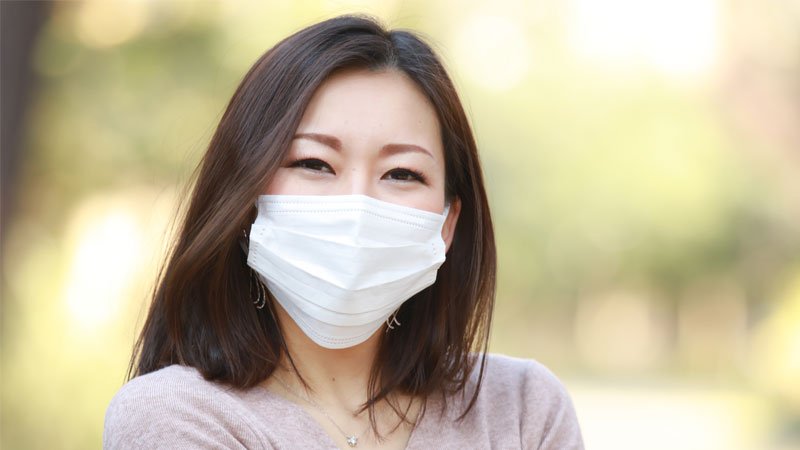Although face masks or face coverings can help to protect our health by slowing the spread of COVID-19, they can unfortunately lead to a whole host of undesirable skincare problems such as blocked pores, breakouts, rashes and irritation. They can also worsen pre-existing conditions such as acne, rosacea and eczema.
The skincare issues experienced by healthcare workers wearing surgical-grade masks has been well documented throughout the pandemic, and while wearing a cloth face covering is nowhere near as problematic, they can still have a detrimental effect on the skin if worn for prolonged periods of time.
Why do face coverings cause skincare problems?
Wearing a face mask traps moisture, sweat, oil and dirt close to our skin which can lead to blocked pores, blackheads, blemishes, and acne. The issue of breakouts has become so common that the word ‘maskne’ has been added to the Urban Dictionary!
When we breathe or talk, moisture from our breath is trapped within the mask, creating a humid environment that can upset our skin’s natural oil and pH balance and cause an overgrowth of bacteria.
Lots of people also experience irritation from the mask rubbing on their skin. Friction from the mask causes the skin to lose its natural moisture and damages its protective layer, which can lead to dry, irritated skin and inflammation.
What steps can we take to keep the skin clear and healthy
Firstly, you should choose a mask made from tightly woven cotton and avoid synthetic fabrics such as polyester, nylon and rayon which can make you sweat. 100% cotton masks will be more breathable and feel softer on the skin. Avoid cheap, badly made masks that have any rough bits that could rub and irritate the skin. Cloth masks should be washed regularly to remove oil, dirt and bacteria that could cause breakouts. It may help to use washing detergents for sensitive skin as the chemicals in some detergents can cause irritation. Give the mask an extra rinse to remove any detergent build-up.
Keeping the skin clean is one of the most important ways of preventing blocked pores and breakouts. Don’t be tempted to over-cleanse though as this will strip the skin of natural oil and cause it to produce more. Use gentle, cleansers and toners that will soothe, hydrate and protect your skin’s barrier function. Our Cucumber Cleanser and Micellar Cleansing Water with Aloe Vera and Chamomile are suited to all skin types including sensitive.
While exfoliation can help to unclog the pores and reduce blemishes, it is best to avoid harsh exfoliants which could further irritate the skin. Try using our ultra-fine Bamboo Powder once or twice a week to gently exfoliate and improve the condition of the skin.
Use alcohol-free skin toners after cleansing. Chamomile, Lavender or Rose Hydrolats can be used for toning dry or sensitive skin and Witch Hazel is recommended for oily, blemished skin. These are 100% pure and natural and very gentle on the skin. They can also be used as facial spritzes during the day to re-hydrate and refresh the skin.
Using a good moisturiser on your face throughout the day helps to lock in moisture, boost the skin’s barrier function and decrease friction between the skin and mask.
Our fragrance-free Moisturising Cream can be used on all skin types including sensitive skin. It can be used as it is, or you can add essential oils to support your particular skincare concern – whether that be anti-inflammatory oils to soothe irritation or antiseptic, antibacterial oils to combat breakouts.
A thicker ointment or salve could also be used on particularly sensitive areas to protect against chafing.
If breakouts are an issue, it might help to minimise the amount of makeup you wear under your mask and to keep it as light as possible. Using a water-based foundation and breathable makeup will help to prevent blocked pores.
Recommended Aromatherapy Blends
Soothing Cleanser & Toner
Mix 1 drop of Spearmint essential oil with 5ml of Cucumber Cleanser, Micellar Water or SLS Free Bath & Shower Gel (which can be used as a gentle facial wash).
Tone the skin after cleansing with 1 drop of Spearmint oil mixed in 5ml of Chamomile Hydrolat.
Spearmint is cleansing and soothing for sensitive skin. It can help to alleviate red, inflamed, itchy, irritated skin, as well as cleanse and balance oily skin.
Breakout Gel
Mix 50ml Aloe Vera & Seaweed Gel with 10 drops Tea Tree, 10 drops Lavender and 3 drops German Chamomile. Mix well. Dab onto any spots or areas of redness to help fight infection and reduce inflammation.
Moisturiser for Sensitive Skin
Mix 100ml of Moisturising Cream, 5ml Jojoba, 5ml Extra Virgin Coconut Butter, 10 drops Lavender, 2 drops German Chamomile and 2 drops Rose.
Facial Oil For Dry and Sensitive Skin
Mix 5ml Evening Primrose, 5ml Jojoba and 20ml of Apricot Kernel Oil. Add 2 drops of Roman Chamomile essential oil, 2 Neroli, 2 Rose, 5 Lavender and 4 Sandalwood.
Sharon Lovett
Marketing Manager

